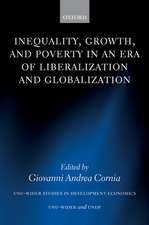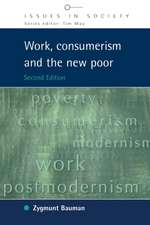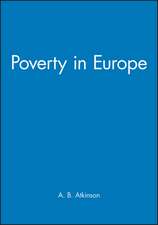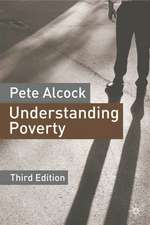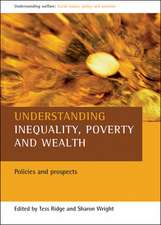Poor People`s Politics – Peronist Survival Networks and the Legacy of Evita
Autor Javier Auyeroen Limba Engleză Paperback – 31 dec 2000
Looking closely at the slum-dwellers' informal problem-solving networks that are necessary for material survival and the different meaning of Peronism within these networks, Auyero presents the first ethnography of urban clientelism ever carried out in Argentina. Revealing a deep familiarity with the lives of the urban poor in Villa Paraíso, a stigmatised and destitute shantytown of Buenos Aires, Auyero demonstrates the ways in which local politicians present their vital favors to the poor and how the poor perceive and evaluate these favours. Having penetrated the networks, he describes how they are structured, what is traded, and the particular way in which women facilitate these transactions. Moreover, Auyero proposes that the act of granting favors or giving food in return for votes gives the politicians' acts a performative and symbolic meaning that flavours the relation between problem-solver and problem-holder, while also creating quite different versions of contemporary Peronism. Along the way, Auyero is careful to situate the emergence and consolidation of clientelism in historic, cultural, and economic contexts.
Poor People's Politics re-examines the relationship between politics and the destitute in Latin America, showing how deeply embedded politics are in the lives of those who do not mobilise in the usual sense of the word but who are far from passive. It will appeal to a wide range of students and scholars of Latin American studies, sociology, anthropology, political science, history, and cultural studies.
Preț: 260.57 lei
Nou
Puncte Express: 391
Preț estimativ în valută:
49.87€ • 51.87$ • 41.17£
49.87€ • 51.87$ • 41.17£
Carte tipărită la comandă
Livrare economică 15-29 aprilie
Preluare comenzi: 021 569.72.76
Specificații
ISBN-13: 9780822326212
ISBN-10: 0822326213
Pagini: 272
Ilustrații: 1 table, 2 figures
Dimensiuni: 149 x 227 x 25 mm
Greutate: 0.37 kg
Ediția:New.
Editura: MD – Duke University Press
ISBN-10: 0822326213
Pagini: 272
Ilustrații: 1 table, 2 figures
Dimensiuni: 149 x 227 x 25 mm
Greutate: 0.37 kg
Ediția:New.
Editura: MD – Duke University Press
Recenzii
"Other people write about patronage politics as a form of organization, as a scourge to eradicate, or as a necessary evil on the way to full democracy. Javier Auyero writes about it as a raucous, improvised, crucial way of surviving poverty and inequality. Reporting perceptive first-hand observations in playful, energetic prose, Auyero illuminates poor people's politics in Argentina and elsewhere." - Charles Tilly, Columbia University
"At the level of most political science literature on urban poverty and clientelism, this work is genuinely pathbreaking. Combining the best of 'thick description' ethnography with a sense of more global processes at work in a society, Auyero uses the most up - to - date analytical frameworks to interrogate an object of study that has rarely - if ever - been so addressed. This is a book to be reckoned with over the next few years and beyond." - Daniel James, author of Doña María's Story: Life History, Memory, and Political Identity" . . . this book gives valuable insight into how people at the margins of their society survive thecurrent, harsh economic climate of Argentina."--Jrnl of the Royal Anthropological Insitute, June2002
"Other people write about patronage politics as a form of organization, as a scourge to eradicate, or as a necessary evil on the way to full democracy. Javier Auyero writes about it as a raucous, improvised, crucial way of surviving poverty and inequality. Reporting perceptive first-hand observations in playful, energetic prose, Auyero illuminates poor people's politics in Argentina and elsewhere." - Charles Tilly, Columbia University "At the level of most political science literature on urban poverty and clientelism, this work is genuinely pathbreaking. Combining the best of 'thick description' ethnography with a sense of more global processes at work in a society, Auyero uses the most up - to - date analytical frameworks to interrogate an object of study that has rarely - if ever - been so addressed. This is a book to be reckoned with over the next few years and beyond." - Daniel James, author of Dona Maria's Story: Life History, Memory, and Political Identity " ... this book gives valuable insight into how people at the margins of their society survive the current, harsh economic climate of Argentina."--Jrnl of the Royal Anthropological Insitute, June 2002
"At the level of most political science literature on urban poverty and clientelism, this work is genuinely pathbreaking. Combining the best of 'thick description' ethnography with a sense of more global processes at work in a society, Auyero uses the most up - to - date analytical frameworks to interrogate an object of study that has rarely - if ever - been so addressed. This is a book to be reckoned with over the next few years and beyond." - Daniel James, author of Doña María's Story: Life History, Memory, and Political Identity" . . . this book gives valuable insight into how people at the margins of their society survive thecurrent, harsh economic climate of Argentina."--Jrnl of the Royal Anthropological Insitute, June2002
"Other people write about patronage politics as a form of organization, as a scourge to eradicate, or as a necessary evil on the way to full democracy. Javier Auyero writes about it as a raucous, improvised, crucial way of surviving poverty and inequality. Reporting perceptive first-hand observations in playful, energetic prose, Auyero illuminates poor people's politics in Argentina and elsewhere." - Charles Tilly, Columbia University "At the level of most political science literature on urban poverty and clientelism, this work is genuinely pathbreaking. Combining the best of 'thick description' ethnography with a sense of more global processes at work in a society, Auyero uses the most up - to - date analytical frameworks to interrogate an object of study that has rarely - if ever - been so addressed. This is a book to be reckoned with over the next few years and beyond." - Daniel James, author of Dona Maria's Story: Life History, Memory, and Political Identity " ... this book gives valuable insight into how people at the margins of their society survive the current, harsh economic climate of Argentina."--Jrnl of the Royal Anthropological Insitute, June 2002
Notă biografică
Textul de pe ultima copertă
"At the level of most political science literature on urban poverty and clientelism, this work is genuinely pathbreaking. Combining the best of 'thick description' ethnography with a sense of more global processes at work in a society, Auyero uses the most up-to-date analytical frameworks to interrogate an object of study that has rarely--if ever--been so addressed. This is a book to be reckoned with over the next few years and beyond."--Daniel James, author of "Dona Maria's Story: Life History, Memory, and Political Identity "
Cuprins
Acknowledgments ix
Who Is Who in the Peronist Network xiii
Introduction: The Day of the Rally
Complaining about T-shirts on Peron's Birthday 1
1. "They Were Mostly Poor People"
Poverty and Inequality in Contemporary Buenos Aires 29
2. "Most of Them Were Coming from Villa Paraiso"
History and Lived Experiences of Shantytown Dwellers 45
3. "They Knew Matilde"
The Problem-Solving Network 80
4. "We Will Fight Forever, We Are Peronists"
Eva Peron as a Public Performance 119
5. The "Clientelist" Viewpoint
How Shantytown Dwellers Perceive and Evaluate Political Clientelism 152
6. "They Were All Peronists"
The Remnants of the Populist Heresy 182
Conclusions
Problem Solving through Political Mediation as a Structure of Feeling 205
Epilogue
Last Rally 215
Notes 219
Bibliography 237
Index 255
Who Is Who in the Peronist Network xiii
Introduction: The Day of the Rally
Complaining about T-shirts on Peron's Birthday 1
1. "They Were Mostly Poor People"
Poverty and Inequality in Contemporary Buenos Aires 29
2. "Most of Them Were Coming from Villa Paraiso"
History and Lived Experiences of Shantytown Dwellers 45
3. "They Knew Matilde"
The Problem-Solving Network 80
4. "We Will Fight Forever, We Are Peronists"
Eva Peron as a Public Performance 119
5. The "Clientelist" Viewpoint
How Shantytown Dwellers Perceive and Evaluate Political Clientelism 152
6. "They Were All Peronists"
The Remnants of the Populist Heresy 182
Conclusions
Problem Solving through Political Mediation as a Structure of Feeling 205
Epilogue
Last Rally 215
Notes 219
Bibliography 237
Index 255
Descriere
Examines how Argentina's urban poor use political networks and informal webs of reciprocal help to solve their everyday survival needs








